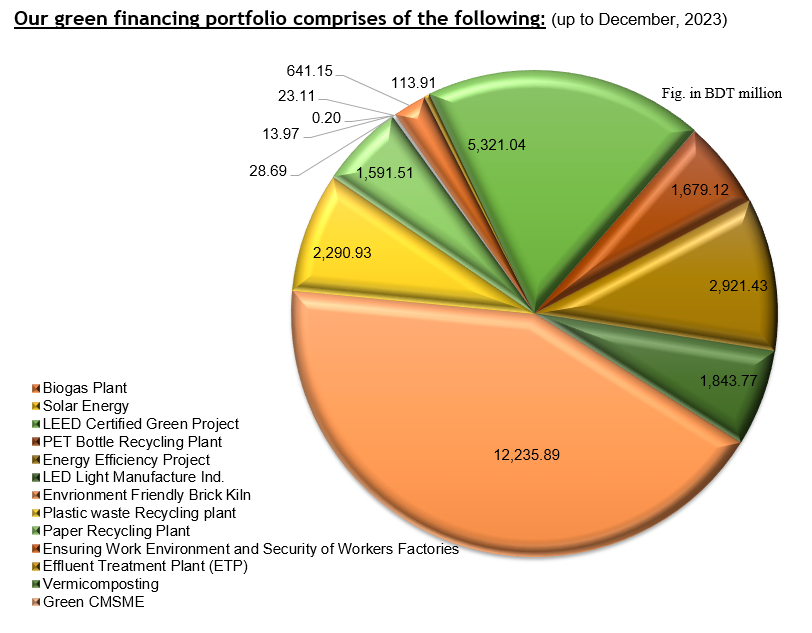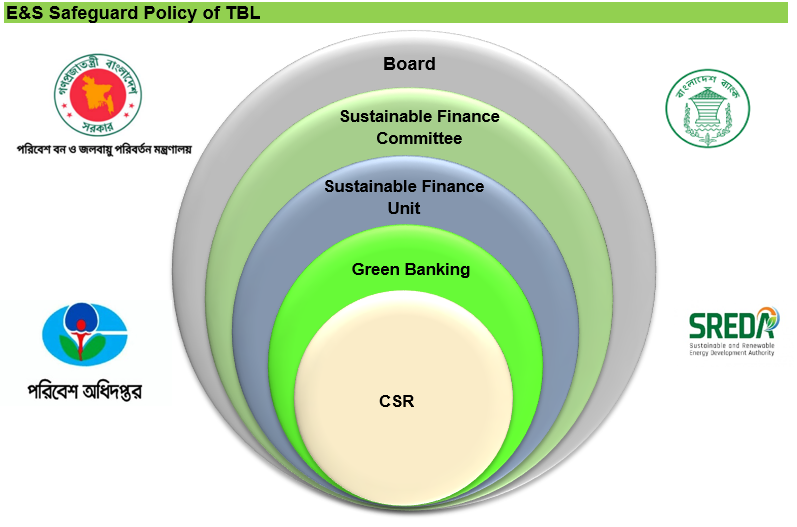Green Finance is a term which refers to those projects that support sustainable development which includes investment in biodiversity protection, water sanitation, industrial pollution control, energy efficiency, climate change adaptation, renewable energy etc. It refers to financing in “eco-friendly” projects which will support for making healthy environment, not only for the present but also for the future generation.
Trust Bank is committed to finance in environment friendly and energy efficient projects such as LEED certified industry (Certified Green Industry & Green Building/Green Featured Building), Recycling & Recyclable Product (PET Bottle recycling plant), Energy Efficiency project, Ensuring Work Environment and Security of Factories Workers, Effluent Treatment Plant (ETP), Hybrid Hoffman Kiln (HHK), Zigzag or equivalent Technology in Brick Field. We believe that growth should be sustainable. The green growth cannot be achieved without green investment. It is mentionable that Trust Bank has started contributing in the renewable energy sector through financing in Bio-gas plant, Solar-home system and Solar irrigation pumping system.
Trust Bank is also committed to practice digital, nearly paperless, green banking operations by making best use of the information technology and related professional skills. We widely practice mobile banking and internet banking with an advanced technology and platform.
Trust Bank organized a “Green Event” followed by a Seminar on “Renewable Energy: an eco-friendly investment for green living” for creation of awareness among the mass people.
Trust Bank has developed various green products for financing in green sector which is directly or indirectly contributing to the reduction of carbon emissions and increasing the net of financial inclusion.
We have signed Participation Agreement with Bangladesh Bank under refinance scheme for lending in green product/initiatives (e.g. investment in sectors like Renewable Energy, Green Industry/Building Brick Manufacturing and Waste Management etc.). After signing participation agreement with Bangladesh Bank, Trust Bank finance in this sector has been recorded at BDT 641.15 million against 2,934 nos. of Bio gas plants in different locations of the country, under 4 cow model of Bangladesh Bank. Trust Bank also financed a cluster based biogas gas plants at Dhamrai, Dhaka.
Trust Bank also finance for installation of 4,197 Solar Energy Systems through MFIs linkage in the district of Jenaidah Munsigonj, Jessore, Satkhira, Panchagrarm, Kurigram and Mymensingh. A village named Howlipara, Jenaidah, is yet to be named as ‘Solar Village’.

ENVIRONMENT RELATED INITIATIVES
Environmental & Social Obligations:
Trust Bank PLC. as one of the leading commercial banks in the country always conducts in house banking activities with a view to use its resources avoiding waste and reducing energy consumption at maximum level. To help our clients reaching the highest environmental and social standards Trust Bank PLC. already adopted updated Environmental & Social Risk Management (ESRM) Policy of Bangladesh Bank. Under this policy we carefully assess the extent of Environmental and Social impacts before making any financing decision and selecting any project.
To Trust Bank, sustainable banking means banking beyond just profits. It is about banking for profitability while keeping the economic, social and environmental considerations at the front and center of what we do. Today, sustainable banking is one of the core pillars of bank’s values-based strategy.
On the other hand, to help our clients reaching the highest environmental and social standards Trust Bank PLC. has already formulated Environmental & Social Risk Management (ESRM) Policy. Under this policy we carefully assess the extent of Environmental and Social impacts before making any financing decision and selecting any project. We work with our clients to apply a clearly defined set of environmentally and socially responsible international standards and good practice to mitigate and manage E&S risks and impacts.
Governance structure adhering to the terms of reference outlined by Bangladesh Bank through guidelines and circulars, formation of Sustainable Finance Unit is done under Credit Risk Management Division. And the Sustainable Finance Committee is formed with the senior management of the bank who serve as the head authority for supervising all the bank’s sustainability activities under the guidance of the Board. The bank’s sustainability activities are performed through sustainable banking and corporate social responsibility with the vision of making a value based banking for a greener and sustainable future.
Sustainable finance refers to the process of taking Environmental, Social and Governance (ESG) considerations into account when making investment decisions leading to sustainable economic activities and projects.

In-house Green Initiatives of Trust Bank Ltd.
Electricity Consumption:
- Using Day lights and reducing electricity consumption with motion sensor and/or automatic dimming switches system at Corporate Office.
- Ensure economic use of electricity
- Increased Use of LED Lights at Corporate Office and branches.
- Shutdown the computer properly and switch off the computer monitor before leaving office each day.
- Reducing energy consumption an Energy Audit has been conducted by the Certified Auditors of Sustainable and Renewable Development Authority (SREDA) on 02(Two) model branches of Trust Bank PLC. i,e. Millennium Corporate and Centennial Branch respectively.
- Increased use in internet banking.
- Increased use in mobile banking with Robi Axiata named ‘tap’
- Introducing Mobile App named ‘Trust Money app’.
- Ensure that light, fans, air conditioner have been switched off before leaving office each day.
Fuel Consumption:
• Ensure economic use of fuel.
• Encouraging the TBL officials to purchase fuel efficient vehicles to reduce gas and petroleum consumption.
Paper Consumption:
• Where possible use online communication (e-mail, IP message etc.) instead of printed communication.
• Think twice before taking a print.
• Take print on the both side of paper to save paper consumption.
• Use scrap paper for taking draft print and as note pads.
Water Consumption:
• Do not misuse drinking water; and
• Ensure economic use of water in all other cases.
• Avoid use of disposable cups/glasses to become more eco-friendly;









